Dear Family & Friends,
There are a few things those of us experiencing benzodiazepine (BZD)-induced neurological injury and illness would like to share with you. If it wasn’t so important for you to understand, we wouldn’t be asking you to take the time to read and consider this plea for understanding.
By learning more about what we are going through, you nurture hope and discourage despair.
If you haven’t already, please open your heart and mind and really hear us.
The Struggle Is Real
Chronic illness has a heartbreaking way of creating a wide range of limitations and stealing quality of life. Those on the outside looking in may struggle to grasp the suffering and grief endured on a daily basis.
Unfortunately, there is an additional, prevailing struggle among those of us experiencing BZD-induced damage and illness. The nature and longevity of this affliction easily create a scenario of devastating relationship strain and loss. A portion of this may be due to our level of disability, which ultimately leads to decreased ability to function and socialize. It stands to reason our relationships will suffer to some degree. However, the problem primarily seems to stem from skepticism, misunderstanding and frustration coming from family and friends.
Feeling forgotten and abandoned, our closest relationships often begin to consist of the amazing people we meet online fighting the same battle. Due to the lack of support from the outside world, we not only struggle to survive ourselves, but we also spend much of our time supporting and becoming literal lifelines for our peers.
If we are exceedingly fortunate, we may have one or a few loved ones who have educated themselves. They support us on what we are going through and help us survive. For this, we are eternally grateful. Considering some of our fellow sufferers have virtually no one, when we have this “luxury” we know we are one of the fortunate ones. Receiving understanding and support should never have to be considered a “luxury.”
Tragically, in an overly-common scenario, we are invalidated and made 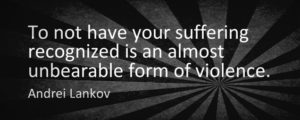 out to be “crazy” by others, breeding feelings of shame and alienation. The layers of loss and trauma we endure (not only because of the actual drug harm but because of how we are treated by others) become thicker and thicker.
out to be “crazy” by others, breeding feelings of shame and alienation. The layers of loss and trauma we endure (not only because of the actual drug harm but because of how we are treated by others) become thicker and thicker.
Why Are We So Misunderstood?
Feeling invalidated and abandoned can be a potential scenario among those suffering from other chronic illnesses/diseases too – especially the less understood and more “invisible” ones. But it is frequently observed that many other types of maladies garner more understanding and compassion. We can easily surmise this is due to their more common medical and public recognition. To add to the confusion, how these drugs affect people varies from individual to individual. Some may suffer less, while others sustain deep damage and horrific, long-term injury.
What we deal with is commonly shrouded in misunderstanding and confusion. After all, how could a medication a doctor prescribed, taken exactly as directed, cause such intense harm to our brain and central nervous system (CNS)? This challenges the core belief that doctors know best and prescription medications are safe.
In addition, this may hit a little too close to home for those we know. Due to the over-prescribing of BZDs, there is a likelihood that family and friends we try to reach out to may be taking this same class of drug. They may not be willing to “go there.” “Going there” would mean they would have to accept they could be in our shoes one day. And if they welcome the facts surrounding what has happened to us, it would challenge what they may consider a personal unshakable foundation: Their absolute faith in doctor care and pharmaceuticals. We understand to consider the polar opposite of that concept is frightening, uncharted territory. It once was for us too.
So despite the undeniable evidence supporting our experience, those we try to reach may continue to suffer from what is commonly referred to as cognitive dissonance. This may actually foster an attitude of irritation and resentment towards us. Why? Because what we are experiencing is representative of something so unbelievable, unacceptable, and quite frankly, terrifying. Whether intended or not, others begin shutting us out.
The Other Side of the Coin
As previously stated, we frequently observe that people going through other more “mainstream” illnesses, some of which potentially involve less severity in symptoms and higher functionality, tend to receive much more acceptance and compassion. And they truly deserve it. This is not a competition.
But acceptance and compassion are equally deserved among those who have been iatrogenically harmed.
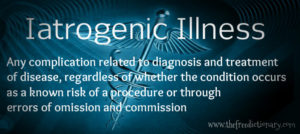 The suffering is just as real and valid as any other type of human suffering. In many cases, our extensive neurological damage from BZDs can be even more severe, disabling and potentially life threatening.
The suffering is just as real and valid as any other type of human suffering. In many cases, our extensive neurological damage from BZDs can be even more severe, disabling and potentially life threatening.
I invite you to read the all-too-common generalized scenario below. With an open mind, consider how our experience might compare to the experience of others going through more “mainstream” illness:
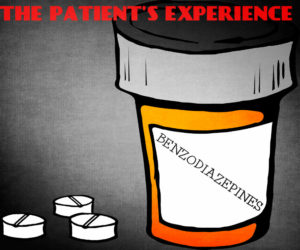
A patient struggling with insomnia is given a BZD prescription by their trusted doctor. Given no warnings about the dangers of the drug, they are assured it is a safe, “low dose.” The patient takes the BZD responsibly and exactly as prescribed.
Initially, it seems to help, but, as is too often the case, things begin to go downhill. Adverse effects and tolerance to the drug begin to manifest.
The patient progressively begins experiencing varying symptoms and a declining health state. They never receive any solid answers from doctors as to what is wrong with them. It is suggested it is “just anxiety” and they receive other diagnoses like depression, generalized anxiety disorder (GAD) and irritable bowel syndrome (IBS). They are told to increase their dose and are advised to take additional prescriptions to deal with these developing issues. (To read more about common diagnoses/misdiagnoses stemming from or exacerbated by BZD use, click here.)
The patient finally discovers the root cause of their health decline: Brain/CNS disruption and the damaging effects from the BZD prescription they have been taking.
They Are:
- Now forced to be in a fight to reclaim their health and save their life
- In desperate need of support and assistance
- Met with apathy, invalidation and even combative attitudes from most medical professionals, family and friends
- Without appropriate medical support or additional therapies specially tailored to their medical condition
- Experiencing severe physical dependence formed by the drug and are faced with a complex slow taper (Note: Unfortunately, many ill-informed doctors are directing their patients to rapid taper or cold turkey their BZD. This is very dangerous and potentially life threatening.)
- Becoming increasingly more isolated due to the severity of neurological symptoms
- Faced with more nonlinear brain/CNS healing once off the drug (which can take additional months and potentially years)
Due To The Damaging Effects Inflicted On The Brain/Central Nervous System, Every Day They Experience:
- Cognitive Issues
- Crippling nerve and muscle pain
- Squeezing head pain and pressure
- Dizziness
- Severe hypersensitivity to light, sound, smell and touch
- Heightened hypersensitivity/reactivity to other drugs, environmental toxins, supplements and various foods
- Oppressive fatigue
- Gastrointestinal distress
- A state of unbearable adrenaline-laced inner agitation
- Insomnia and sleep issues much worse than what they were initially prescribed the drug for in the first place
- Dark depression and suicidal ideation
- Dozens of other painful, frightening and even bizarre neurological symptoms (To see a comprehensive list of symptoms, click here.)
- The reality of suffering and fear for months on end with little reprieve
Previously a Highly Functional, Social Member of Society, They Now:
- Have no choice but to quit their job
- Struggle to (and many days cannot) take care of their family and other responsibilities
- Have difficulty doing simple tasks or chores like cooking or laundry
- Struggle to eat and bathe themselves many days
- Experience many days when they can barely even get out of bed because of excruciating pain and a plethora of other oppressive neurological symptoms
- No longer (or rarely) drive
- Struggle to (or cannot) shop for themselves
- Are frequently incapable of even reading a book, watching TV or listening to music
- Live in a perpetual state of physical pain and fear
- Spend day after day utilizing coping skills and sheer willpower to survive
- Feel they have to “be strong” and attempt to hide their struggle and pain when around others (because nobody seems to understand)
- Have extremely limited social interaction
- Are experiencing a growing number of personal losses due to the nature of this illness
The Cry That Is Never Really Heard
The isolation sets in and the doom and loneliness are a daily reality. Even when around other people, feelings of being misunderstood and alone abound. Why? Because along the way, family and friends are doubting what is happening. No one seems to “get it” and few even bother to try to understand.
When reaching out to express the horrors they are experiencing, they are met with invalidation (at times abusive invalidation). Some people even fight against and downplay the testimony of genuine prescription medication damage and suffering.
They consistently deal with undermining comments such as:
Well, I take benzodiazepines and I don’t experience any of that.
There must be something else wrong with you.
Medication wouldn’t cause these issues unless you were abusing it.
You look fine – it can’t possibly be as bad as you say it is.
The drug is out of your system now so you should be fine.
You’re an attention seeker.
You just need to mind over matter this.
Usually, There Are No:
- Consistent sentiments of encouragement and support
- Care packages left on the doorstep
- Offers for visits or practical help
- Benefits planned to raise money for the victim (who has sustained massive financial loss with no end in sight)

And, despite there now being a day dedicated to this, World Benzodiazepine Awareness Day (July 11th), very few take much interest in educating themselves or show a desire to get involved and back the cause in their loved one’s honor.
“In space, no one can hear you scream.” – Famous tagline from the movie Alien
In Our Shoes
As you can imagine, there can be an astounding difference between the support those with other “more accepted” illnesses may receive compared to those going through BZD-induced damage and disability.
All of this demonstrates why it is so important for us to have your understanding, as well as your help to continue to raise awareness and education. We should not have to sit here fighting for our lives, suffering to this hellish degree in dark isolation.
Please understand we feel destroyed enough as it is. We feel terrible every single day and cannot believe something like this happened to us. Living with guilt and shame that we can’t do more, we often push ourselves to extremes and then crash and burn. As if the intense symptoms themselves along with invalidation from others isn’t enough! Then we also beat ourselves up for not being able to do more because our bodies are so ravaged that we mentally and physically cannot.
Extreme heartbreak is experienced over our suffering, but what we often grieve the most are the limitations, losses and how invalidated and “unheard” we are through it all. We wonder if we had some other health issue, something that people actually took the time to understand and care about, would we not have to feel so abandoned and shunned?
Please put yourself in our shoes and try to understand how this feels.
We Should Not:
- Be made to feel that our suffering and disability – which came on as a result of a damaging drug a doctor told us we had a medical need for (that we took exactly as prescribed) – is somehow invalid
- Suffer in the shadows made to feel guilt or shame
- Fear speaking out about what happened to us because we might “offend” someone
- Worry that others might get the false impression we are drug addicts who abused our prescriptions (To learn more about physical dependence, which is what most of us experience, and why it is not the same as addiction, click here.)
- Be subjected to others shifting blame away from the true source of harm, onto we, the patients
We were responsible patients abiding by our doctors’ orders. Now our bodies and homes have become our literal torture chambers. Few bother to look inside the chamber, to learn about this, to compassionately understand how bad this really is. Too many are content to stay on the outside, closed minded, making incorrect judgments without attempting to educate themselves on what is happening to patients all over the world.
It Really Is As Bad As We Say It Is
Actually, in reality, it’s even worse than we say it is. There are no words powerful enough in our language to express what many of us are forced to endure for such long periods of time. Yet we continually face others’ harsh judgments. We are often viewed as overly-dramatic, lazy, “mentally ill” and resistant to help or treatment. Therefore, it is assumed, we are choosing this path and are responsible for whatever might be happening to us. This is blatantly inaccurate.
These drugs damaged us and we have literally no other choice here.
Let it be known that one common theme we see among the BZD-injured community is the desperation and yearning to regain health. More than anything, we want to thrive and contribute, once again, to our families, friends and society. We have never seen a group of people with such determination and strength. Scraping and clawing through daily existence, frequently pushing to extreme limits (and well beyond) just to attempt to survive.
Through no fault of our own, we sustained incredible brain/neurological damage. We are fighting to regain our health. The entire process can take many months and years, and we NEED and DESERVE support and understanding along the way.
We would be grateful to hear more people say:
I don’t fully understand, but I want to try, and I’m here to support you however I can.
Please Do:
-
- Acknowledge and validate what is happening to us
- See if there is any way you can help or advocate for us
- Be mindful not to stress us unnecessarily or make us feel guilt for our limitations
- Refrain from telling us what we should or should not be doing (For example: “Maybe you need to try a different medication.”)
- Have patience (This process is not linear and can last a long time)
- Know we aren’t asking for pity but compassion, understanding and encouragement
- Understand just how incredibly strong we have to be every single day
- Show genuine interest and ask us questions – Most of us love it when you ask questions to try to understand what we are going through. It shows you care!
- Let us share our stories and knowledge with you
- Have a look at the additional resources provided at the end of this blog post
Sometimes we just need to be able to talk openly, to be heard and not be invalidated or told what we should or should not be doing. We’ve already spent countless hours educating ourselves, poring over expert medical research and information. We know our own bodies. We know what is happening and what we need to do and what we need to avoid.
At the very least, if you see us talk about this online, there is something very simple you can do that we would appreciate so very much: Take the time to click on links we share and interact with us in a positive manner. Sometimes all we are really looking for is acknowledgment of our incredible daily suffering. We really need to know we are not alone on what often seems to be a lonely deserted island.
Please Do Not Let Our Suffering Be In Vain
It is also monumentally important for us to know that our suffering is making a difference out there. We hope that maybe we can spread education to help others understand and avoid this torture. Sharing our stories and information regarding these drugs is not solely for our own personal benefit, it is also for the benefit of others. This can happen to anyone taking BZD prescriptions. We want you to support and acknowledge us, but we also want to try to help protect you or someone you love from being the next victim.
A Final Thought For Our Family and Friends
It’s okay if you don’t understand. It’s even okay to feel confused or doubtful of our situations. But dare to step outside your comfort zone and look inside. Step past your preconceived notions. Listen to us. Take notice of the information we share and attempt to understand what we are going through. Be a voice for us so we may continue to pave the way for more education, validation and support.
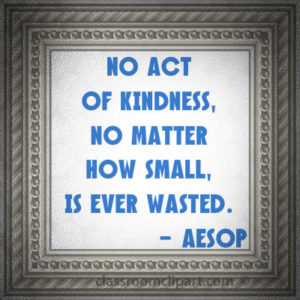 You will not only help those of us already going through this atrocity, but can also learn how to protect yourself and prevent others from suffering in the future.
You will not only help those of us already going through this atrocity, but can also learn how to protect yourself and prevent others from suffering in the future.
The impact you will have by being compassionate, by opening your heart and mind and hearing us can be immeasurable. It may even be the act of kindness that becomes the bright spot in our entire day, week or month. And, you never know, it could be the act of kindness that saves a life.
Sincerely,
All of us who need your support and understanding
RESOURCES:
(Whether you are someone living with and trying to care for someone suffering from benzodiazepine withdrawal syndrome, or you’re simply curious and looking for some perspective, these links may be of interest to you.)
Loved One’s Guide to Benzo Withdrawal: Loved One’s Guide to Benzo Withdrawal’s purpose is to provide information and support for loved ones of those who have been adversely affected by taking Xanax (alprazolam), Valium (diazepam), Klonopin (clonazepam), Ativan (lorazepam) or any other benzodiazepine as prescribed. Accompanying support group for loved ones: Benzo Withdrawal: Loved One’s Guide
Advice for Caregivers of Folks with Post-Acute Withdrawal Syndrome (PAWS) From a Benzo
What We Wish Family and Friends Knew About Benzo Withdrawal
How to Support a Loved One with Benzo Withdrawal Syndrome
Recovery Road: For Family and Carers (Click on “Resources” then go to “For Family and Carers”)
A guide for carers who are helping people to recover from benzodiazepine dependence
Tips for Loved Ones: From a Benzo Survivor
Blog posts are essays submitted by a diverse group of writers engaged in benzodiazepine activism and awareness. Posts may consist of opinion pieces, creative writing, personal stories and/or more scientific research-based writings, etc. W-BAD encourages all bloggers to cite sources within their writing where possible and also encourages public discussion and respectful debate on topics. Please always do your own research and read W-BAD’s Disclaimer, as blog post content should never be a substitute for medical oversight. If you are interested in submitting a blog post to W-BAD, please Contact Us.
SaveSave
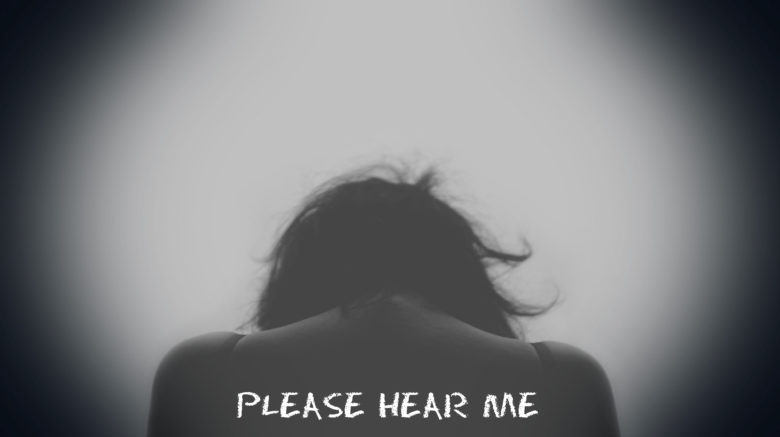

Can’t read this without welling up and gasping for air……………. I wish my Mother was here to read this, maybe then she wouldn’t tell me I were ”imagining” it. Unfortunately I lost her 2 years ago….
Recovery is based on the feeling you have something to go back to career, self respect, family, friends, hobbies, love, joy, contribution to society/others and have not given up hope.
I’m a survivor of being a “cold turkey “ victim. I was on Xanax for 26 years when my doctor decided to stop prescribing the medication. I was up to 5mg/day for anxiety and panic attacks that had actually begun to happen despite being on so much Xanax. I was also put on 16 other medications for GAD, tachycardia, IBS, insomnia etc over a 26 year period. I now know that childhood traumas (raped at 5, father is abusive alcoholic) and mercury poisoning from my dental amalgams were the root cause of my anxiety and depression.
I began having seizures after just one day off and a massive car wreck that ruptured my silicone breast implants that I had from after breast cancer and a mastectomy in 2009. I became suicidal (for a second time in 8 years) and finally ended up in a psych facility.
I have had my ruptured silicone breast implants removed, and all the mercury dental fillings removed and replaced with ceramic fillings.
It’s been 9 months since the negligent cold turkey and I am still battling the acute withdrawal symptoms of anxiety, depression, suicidal thoughts, insomnia, skin crawling, numbness and tingling in my body, itching, swollen tongue, dry mouth, but I’m thankful to be alive.
I have zero support from family and only two friends that have not fled the picture since I began crumbling over 10 years ago. I destroyed the relationship with my (now ex) husband and my daughters. I became unable to tolerate working as a nurse – quitting job after job due to being so unbelievably stressed. I stopped going to church. I became a physical and emotional recluse. All because of a drug that was destroying my brain.
I’m now in counseling for the childhood emotional traumas. I’m back in church even though I struggle to make myself show up. I have a tenuous relationship with my oldest daughter and my granddaughter. I have two friends who support me even though they have no clue what is really happening with my physical and mental symptoms. I struggle just to bathe and eat many days.
But despite all the negative, I’m a strong ass survivor of many things that would have killed someone with a lesser desire to live. I can beat this and so can you. Never give up and know that someone is on your side!
Thank You Anna, For sharing your story and for the encouragement at the end.
I was cold turkeyed by a pshychiatrist 10 years ago, within 3 days I checked myself into a psych ward for 10 days and this doctor ended up switching me to a longer acting benzo and mood stabilizers that made me gain 40 lbs in less than a month. Within the last 2 years I learned of the connection between Alzheimer’s disease and benzodiazepines and I decided to discontinue with the encouragement of a very kind and talented psych NP, I began my current down taper 3 months ago. I started out a bit too fast and now I’m going very slowly on a liquid titration that will bring me to my last .01 ml a year from now. Just past the halfway mark in dose decrease and I have for weeks felt nothing but burnt out depressed exhausted, and that feeling of not being able to think of a single thing that could make me feel alive, well or happy. I do have an enormous amount of hope for healing.
Thanks again for sharing and for reading this comment.
I thank everyone who posts a reply here. Because I too, know how lonely it can be to walk this long & frightening road. It helps to know, that I’m not alone.